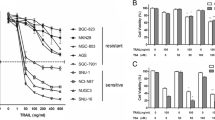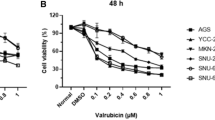Abstract
Triptolide has been reported to exhibit antitumor effects in several cancers. This study investigates the mechanism by which triptolide induces apoptosis of gastric cancer cells. Gastric biopsies were collected for histological evaluation and detection of murine double minute 2 (MDM2) expression. Gastric cancer cells were cultured and treated with different concentrations of triptolide at indicated time points. The expression of MDM2, p53 protein, and target proteins including p21, PUMA, and X-linked inhibitor of apoptosis protein (XIAP) was detected. Apoptosis of cells treated with or without triptolide was evaluated. Our results showed that MDM2 protein was overexpressed in gastric cancer (p < 0.01, resp.). Triptolide induced significant apoptosis of gastric cancer cells in a dose- and time-dependent manner (p < 0.05). In addition, treatment with triptolide strongly inhibited the overexpression of MDM2 in gastric cancer cells, and this MDM2 inhibition led to increased levels of p53 protein and inhibition of XIAP (p < 0.05). However, triptolide failed to increase the expression of p53 target protein p21 and PUMA (p > 0.05). In conclusion, triptolide may induce apoptosis of gastric cancer cells via the inhibition of MDM2 overexpression in a p53-independent manner.




Similar content being viewed by others
References
Bollschweiler E, Berlth F, Baltin C, et al. Treatment of early gastric cancer in the Western World. World J Gastroenterol. 2014;20:5672–8.
Asombang AW, Rahman R, Ibdah JA. Gastric cancer in Africa: current management and outcomes. World J Gastroenterol. 2014;20:3875–9.
Parkin DM, Bray F, Ferlay J, et al. Global cancer statistics, 2002. CA Cancer J Clin. 2005;55:74–108.
Camargo MC, Anderson WF, King JB, et al. Divergent trends for gastric cancer incidence by anatomical subsite in US adults. Gut. 2011;60:1644–9.
Proserpio I, Rausei S, Barzaghi S, et al. Multimodal treatment of gastric cancer. World J Gastrointest Surg. 2014;6:55–8.
Honda R, Tanaka H, Yasuda H. Oncoprotein MDM2 is a ubiquitin ligase E3 for tumor suppressor p53. FEBS Lett. 1997;420:25–7.
Eischen CM, Lozano G. p53 and MDM2: antagonists or partners in crime? Cancer Cell. 2009;15:161–2.
Nakajima N, Ito Y, Yokoyama K, et al. The expression of murine double minute 2 (MDM2) on Helicobacter pylori-infected intestinal metaplasia and gastric cancer. J Clin Biochem Nutr. 2009;44:196–202.
Vazquez A, Bond EE, Levine AJ, et al. The genetics of the p53 pathway, apoptosis and cancer therapy. Nat Rev Drug Discov. 2008;7:979–87.
Shangary S, Wang S. Small-molecule inhibitors of the MDM2–p53 protein–protein interaction to reactivate p53 function: a novel approach for cancer therapy. Annu Rev Pharmacol Toxicol. 2009;49:223–41.
Huang M, Zhang H, Liu T, et al. Triptolide inhibits MDM2 and induces apoptosis in acute lymphoblastic leukemia cells through a p53-independent pathway. Mol Cancer Ther. 2013;12:184–94.
Wang W, Yang S, Su Y, et al. Enhanced antitumor effect of combined triptolide and ionizing radiation. Clin Cancer Res. 2007;13:4891–9.
Mujumdar N, Mackenzie TN, Dudeja V, et al. Triptolide induces cell death in pancreatic cancer cells by apoptotic and autophagic pathways. Gastroenterology. 2010;139:598–608.
Kitzen JJ, de Jonge MJ, Lamers CH, et al. Phase I dose-escalation study of F60008, a novel apoptosis inducer, in patients with advanced solid tumours. Eur J Cancer. 2009;45:1764–72.
Zhu W, Ou Y, Li Y, et al. A small-molecule triptolide suppresses angiogenesis and invasion of human anaplastic thyroid carcinoma cells via down-regulation of the nuclear factor-kappa B pathway. Mol Pharmacol. 2009;75:812–9.
Phillips PA, Dudeja V, McCarroll JA, et al. Triptolide induces pancreatic cancer cell death via inhibition of heat shock protein 70. Cancer Res. 2007;67:9407–16.
Chen G, Sordillo EM, Ramey WG, et al. Apoptosis in gastric epithelial cells induced by Helicobacter pylori and accompanied by increased expression of BAK. Biochem Biophys Res Commun. 1997;239:626–32.
Teodoro JG, Evans SK, Green MR. Inhibition of tumor angiogenesis by p53: a new role for the guardian of the genome. J Mol Med (Berl). 2007;85:1175–86.
Fridman JS, Lowe SW. Control of apoptosis by p53. Oncogene. 2003;22:9030–40.
Shangary S, Wang S. Targeting the MDM2–p53 interaction for cancer therapy. Clin Cancer Res. 2008;14:5318–24.
Chang WT, Kang JJ, Lee KY, et al. Triptolide and chemotherapy cooperate in tumor cell apoptosis. A role for the p53 pathway. J Biol Chem. 2001;276:2221–7.
Eckelman BP, Salvesen GS, Scott FL. Human inhibitor of apoptosis proteins: why XIAP is the black sheep of the family. EMBO Rep. 2006;7:988–94.
Wang DG, Sun YB, Ye F, et al. Anti-tumor activity of the X-linked inhibitor of apoptosis (XIAP) inhibitor embelin in gastric cancer cells. Mol Cell Biochem. 2014;386:143–52.
Acknowledgments
The authors would like to thank the Center for Medical Experiment of Zhongnan Hospital of Wuhan University (Wuhan, China) for technical assistances.
Conflict of interest
The authors have declared that there is no conflict of interest.
Author information
Authors and Affiliations
Corresponding author
Rights and permissions
About this article
Cite this article
Wang, BY., Cao, J., Chen, JW. et al. Triptolide induces apoptosis of gastric cancer cells via inhibiting the overexpression of MDM2. Med Oncol 31, 270 (2014). https://doi.org/10.1007/s12032-014-0270-7
Received:
Accepted:
Published:
DOI: https://doi.org/10.1007/s12032-014-0270-7




